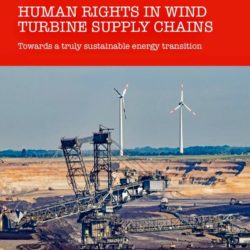Potential human rights violations in wind turbine supply chains

According to a study into wind turbine supply chains, wind turbine manufacturers do not sufficiently know where the minerals they use have come from and hence are unaware of possible violations of human rights in their supply chains.
Four major wind turbine manufacturers – Vestas, Siemens Gamesa Renewable Energy and Nordex – are mentioned by name in the report as running “the risk of contributing to a broad range of human rights abuses and environmental degradation through their global mineral supply chains” because risk-based human rights due diligence is not being done and supply chain transparency continues to be lacking. The ‘Human Rights in Wind Turbine Supply Chains: Towards a truly sustainable energy transition’ report, which is based on a study conducted by the Dutch Centre for Research on Multinational Corporations (SOMO) on behalf of ActionAid, also describes the protection of human rights in the wind energy supply chain as a “blind spot” for the Dutch government and a source of policy incoherence. Despite being bound by international laws, the government does not require respect for human rights or undertaking of due diligence as a condition for authorising permits and subsidies to wind turbine manufacturers.
United Nations Climate Change Conference
In order to reach the goals on renewable energy set during the 2015 United Nations Climate Change Conference in Paris, the Netherlands and other countries around the world will need to rely heavily on renewable energy technologies such as wind turbines, solar cells and batteries for energy storage. However, the increased reliance on wind energy will create stronger demand for the minerals needed to produce wind turbines. The World Bank has estimated that the wind energy industry’s demand for minerals such as manganese, chromium, nickel, copper, aluminium, cobalt, boron, iron and lead will grow by approximately 250 percent by 2050 in order to scale up to meet the agreed 2°C degree temperature rise threshold.
Many of the world’s largest mining countries are known to produce minerals required for wind turbines in a way that is highly damaging to the environment and local communities, causing a multitude of human rights risks and impacts. Adverse impacts linked to the mining of these minerals include armed conflict, corruption, tax evasion, forced displacement, destruction of ecosystems and depletion or pollution of water supplies, as well as the heightened vulnerability of children, women and indigenous people. Companies that use the minerals to manufacture wind turbines are directly linked to those risks through business relationships in their supply chain, and wind turbine manufacturers have a clear responsibility to address these risks of adverse human rights and environmental impacts. Therefore, it is becoming increasingly important to pay attention to the supply chain of wind energy used in wind turbines, the report states.
Sectoral CSR agreement
Although Vestas, Siemens, General Electric and Nordex mention corporate policies on responsible sourcing of minerals and human rights, there is no specific mention of some of the key minerals used for turbine production. SOMO concludes that in order to ensure a truly sustainable and just energy transition takes place in the Netherlands, these companies need to improve their due diligence. A sectoral CSR agreement could be a useful step to increase leverage and coordinate due diligence efforts. In this case, it will be important that wind turbine manufacturers are part of the process and that the agreement addresses risks in international metal supply chains too. However, this does not replace the responsibility of each company to respect human rights and conduct due diligence to identify and prevent risks in international supply chains, according to the report.










